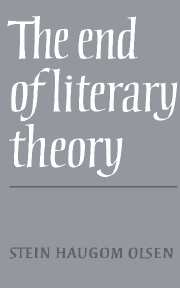Book contents
- Frontmatter
- Contents
- Preface
- Literary aesthetics and literary practice
- Interpretation and intention
- Authorial intention
- Text and meaning
- The ‘meaning’ of a literary work
- Defining a literary work
- What is poetics?
- On unilluminating criticism
- Criticism and appreciation
- Value-judgements in criticism
- Literature, fiction, and reality. A problematic relationship
- Thematic concepts: where philosophy meets literature
- Literary theory and literary aesthetics
- Notes
- Bibliography
- Index
Literary theory and literary aesthetics
Published online by Cambridge University Press: 05 November 2011
- Frontmatter
- Contents
- Preface
- Literary aesthetics and literary practice
- Interpretation and intention
- Authorial intention
- Text and meaning
- The ‘meaning’ of a literary work
- Defining a literary work
- What is poetics?
- On unilluminating criticism
- Criticism and appreciation
- Value-judgements in criticism
- Literature, fiction, and reality. A problematic relationship
- Thematic concepts: where philosophy meets literature
- Literary theory and literary aesthetics
- Notes
- Bibliography
- Index
Summary
ONE
All the essays in this collection are exercises in what may be called ‘literary aesthetics’. They are concerned with philosophical problems that arise in connection with the apprehension (understanding, appreciation) and evaluation of literary works and in connection with the definition of the literary work itself and the existence and role of a literary institution. These are problems concerning aesthetic perception, aesthetic judgement, authorial intention, truth and fiction. The problems are of a type that have analogies in other areas of philosophy, and in these essays techniques and arguments from these other areas have been applied. The discussions have been firmly focused on certain philosophical problems and no attempt has been made in these essays to build or apply a systematic theory of literature. Instead, systematic theories of literature have often been criticized because they make unwarranted epistemological or logical assumptions which make a theory an obstacle rather than an aid in understanding the phenomenon of literature.
Even though the essays do not present a systematic theory, they employ and develop a consistent philosophical perspective on literature and the literary work. Central to this perspective is the idea of a practice or an institution. Though this concept is in itself nebulous, a number of suggestions have been made in legal philosophy and in the philosophy of language which give the concept several distinctive and theoretically useful features.
- Type
- Chapter
- Information
- The End of Literary Theory , pp. 196 - 211Publisher: Cambridge University PressPrint publication year: 1987



